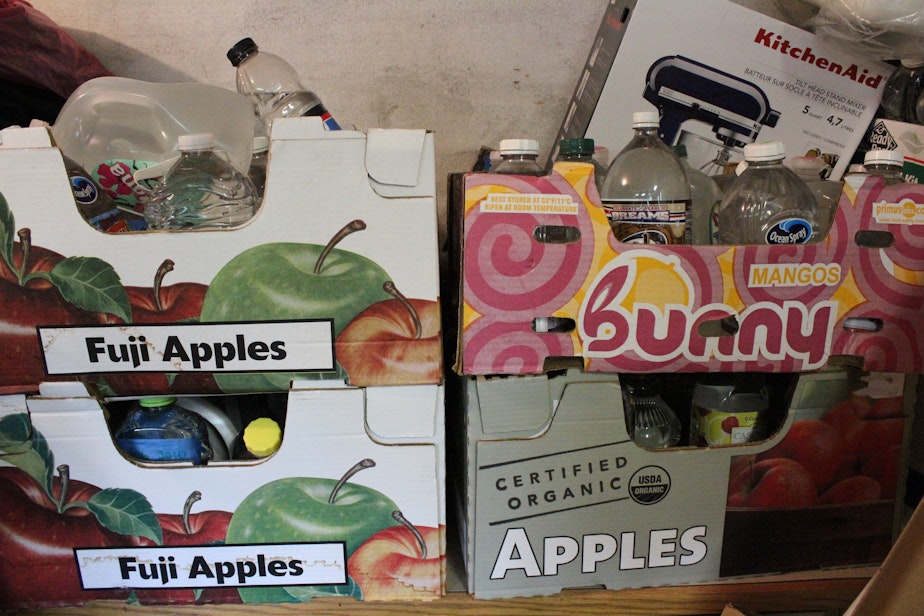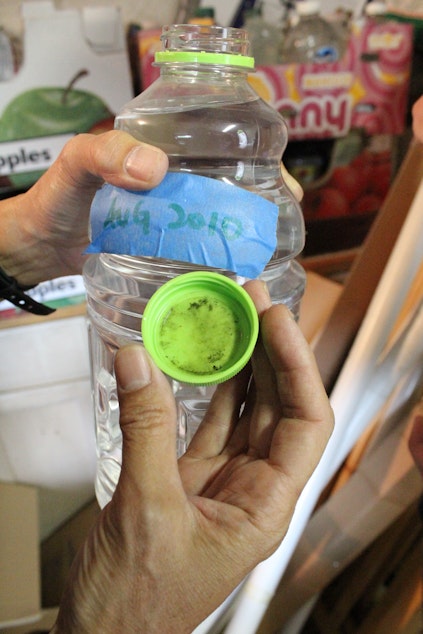You may want to check your emergency water, because we did and ours was ... MOLDY
I went looking for the bottles of emergency water that I had filled up and stored in my garage. There they were, under the old hamster cage.
And when I opened one of them … ewwww.
I was looking for an answer to a question from KUOW listener Steph Austin: If you store bottled water in case of an earthquake, does it ever expire?
I asked Matt Auflick to come over to my house and evaluate my water supply. He’s an expert on preparedness from the Seattle Office of Emergency Management.
First, he checked the store-bought water I had.
"Yeah, oh, I see a date. Best by, 8/17/13 ... No, this says 15,” he said. “So the manufacturer’s date was probably 13."
Yuck! This water expired THREE YEARS AGO.
Sponsored
But here’s the thing. McAuflick said putting a date on water is a manufacturer’s choice. The Food and Drug Administration doesn’t put any shelf life on bottled water.
He said water that’s factory sealed never ACTUALLY goes bad.
"Will I be able to drink this if the Big One hits?” he said. “Most things point to the fact that it will probably change in taste a little bit. And maybe even in color over time. But if that’s what you have, then that’s what you have."
With one important caveat — the seal needs to be intact.

Sponsored
Store-bought water isn’t the only kind of water people have in their emergency kits. Over the years, many of you have stored up tap water in old juice or soda bottles that you’ve carefully sanitized.
We found a bunch of those in my garage too. Some dated back to 2010.
"This still looks pretty good. Let’s open it up,” I said. “Oh … this doesn’t smell so good actually."
"Look at the bottom of the lid,” Auflick said.
Sponsored
“Oh yeah, there’s mold."
And, Auflick said, the mold means that 8-year-old bottle of tap water is probably not so great to drink.

So what’s the best practice for safely storing water? I put that question to Scott Meschke, a professor of microbiology at the University of Washington and he’s an expert on bottled water.
Sponsored
"A good practice, every six months or so for home bottled water, change it out or replenish it, whereas with store-bought water you are probably good for two years,” Meschke said. “The rule of thumb I follow is every two years to at least check on it."
Meschke also said it’s important to check the bottles to make sure they haven’t cracked or leaked.
Also, pay attention to the type of plastic that your water is stored in.
Look at the numbers printed inside that little triangle on the bottle. It’s the number 7 plastic, used for things like sports bottles, or camping bottles, that might contain the chemical we’ve all been hearing about, BPA. Meschke said you probably shouldn’t use those bottles for your emergency kit, but then again, it might not matter.
"It would be long-term exposure to BPA to cause much of a health concern, and so a short term exposure in an emergency situation is probably nothing you would worry about," he said.
Sponsored
So if the big one does hit tomorrow, what can you do with water gone bad? “If that is the situation where that is the only water you had,” Auflick said, “there are some things that you can do to treat it."
- You can boil it.
- Add a few drops of bleach.
- Run it through a water filter.
Click here for advice from federal experts on storing your water.
You can listen to a longer version of this SoundQs story and subscribe to the podcast on your favorite podcast app.
Have a question about the Seattle region for us to answer? Drop it here (if you don't see the form, hit refresh):




